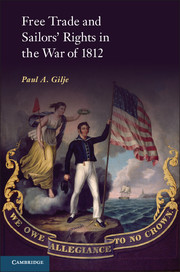16 - The Language of Combat
Published online by Cambridge University Press: 05 March 2013
Summary
Free trade and sailors’ rights remained a potent clarion during the war. The conflict created some new language of combat – words and phrases used to generate support for the American cause. Men declared that they would “CONQUER OR DIE” as they marched into Canada, while others looked to a call for vengeance as they charged into battle. This rhetoric, however, was often ephemeral. Some phrases, like “Don't give up the ship” and “We have met the enemy and they are ours,” have been repeated in our histories of the war so often that they have become part of a national mythology. The language of combat also highlighted a few individuals; Andrew Jackson, for example, was the “Hero of New Orleans.” And of course, after the Battle of Baltimore in 1814, Francis Scott Key wrote the poem “Defence of Fort McHenry,” later to become known as “The Star Spangled Banner,” which glorified the American flag. As important as all of this language became for Americans, for the generation of men and women who lived through the War of 1812, free trade and sailors’ rights remained a source of inspiration and served as an explanation for the war that reflected national ideals. Americans clung to Porter's motto as tenaciously as John Alvison had as he expired on the deck of the Essex “with the words rights quivering from his lips.”
Part of the reason for the continued resonance of Porter's motto lay in the dismal nature of the war itself, which made it difficult to sustain many of the other rallying cries. Despite the optimism of Jefferson and other Republicans, the war quickly became a disaster on land. With unbounded confidence, the Americans planned to invade Canada during the summer of 1812 along three separate fronts: in the West, across the Niagara River, and at the Lake Champlain corridor. All of these campaigns ended in failure. After six months of fighting, not only had the military not made any inroads against the British, but a large swath of United States territory had fallen into enemy hands. Over the next few years the arena of conflict spread to the South and along the Atlantic Coast. Americans managed a few successes, but the invasion of Canada was as elusive as ever. Defeats outnumbered victories. Whatever the claims of politicians, by the end of the war the nation was on the brink of falling apart.
- Type
- Chapter
- Information
- Free Trade and Sailors' Rights in the War of 1812 , pp. 215 - 227Publisher: Cambridge University PressPrint publication year: 2013



